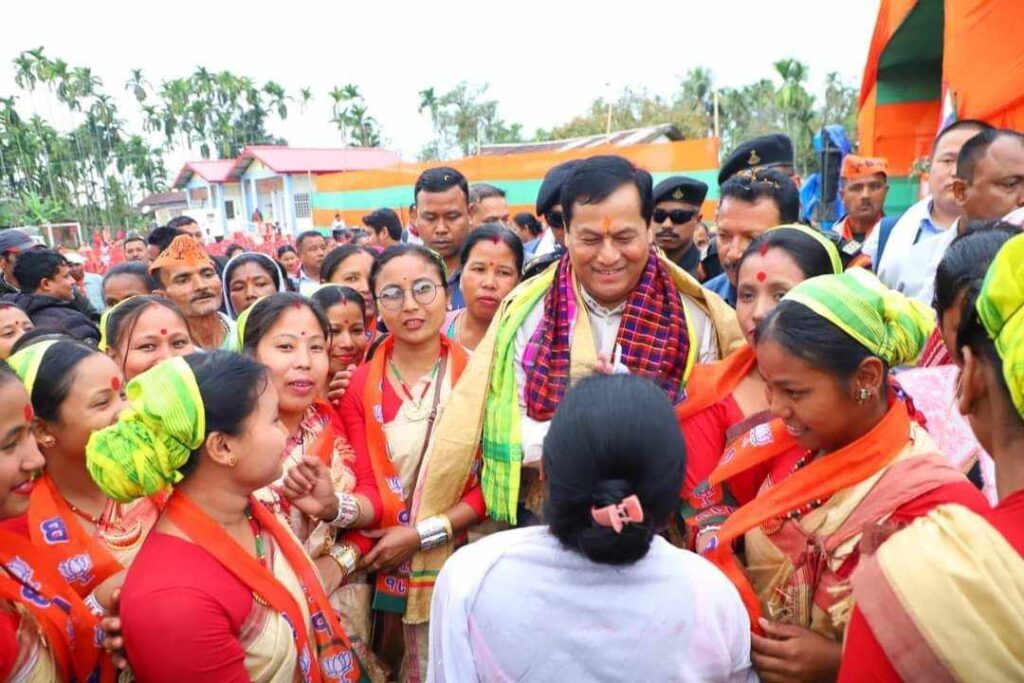Polling Begins in India: 969 million Voters to Participate in 7 Phases of the National Elections
BRICS, 22 Apr 2024
Nava J. Thakuria | Pressenza - TRANSCEND Media Service

Pressenza International Press Agency
19 Apr 2024 – Guwahati: The biggest electoral show on Earth begins in India as polling starts at 7 am today. 969 million eligible voters will exercise their franchise through the electronic voting machines (EVM) to elect 543 members to the 18th Lok Sabha for the next five years. Thousands of nominees from various national and regional political parties (along with some independent candidates) are contesting in the seven-phase polling, conducted by the Election Commission of India (ECI), where the counting of votes will take place on June 4. Results are expected the same day.
India, with a 1.4 billion population (the highest on Earth), has a 545-member lower house of Parliament, where two members are nominated by the President from the Anglo-Indian community. The upper house of Indian Parliament (Rajya Sabha) has 250 members of which 238 are elected by the legislatures from the States and union territories. A maximum of 12 members are nominated by the President for their contributions to art, literature, science, social services, etc. The Vice-President usually presides over the Rajya Sabha sessions, whereas the Speaker runs the show in Lok Sabha.
The first phase of general elections covers 102 Parliamentary constituencies in 12 States and union territories where around 1,625 candidates will seek the mandate of over 166 million voters (including 82 million female, 11,371 third gender, and 18 million first-time electorates). Arunachal Pradesh and Sikkim in northeast India will simultaneously witness voting for constituting their legislative assemblies too. Chief election commissioner Rajiv Kumar assures the voters of free, fair, and peaceful elections and he urges the voters to participate in the biggest festival of democracy. The seven-phase voting exercise, the last one being on June 1, will cost around 1,200 billion rupees.
Five out of 14 Parliamentary seats in Assam go to the polls with key contestants like Central Minister Sarbananda Sonowal, Sitting MP Gaurav Gogoi, Tapan Gogoi, Pradan Barua, etc. The largest State in the far eastern region will witness two more phases of polling on April 26 and May 7. Poll procedures are going on in Inner Manipur and Tripura West seats are also going on (Outer Manipur and Tripura East will go to polls on 26 April). Similarly, polling begins in Arunachal Pradesh for both seats with key candidates Kiren Rijiju, Nabam Tuki, Tapir Gao, lone seat in Mizoram, Nagaland, and Sikkim.
Voting is also under progress in Tamil Nadu for all its 39 Parliamentary seats, where all five seats in Uttarakhand have gone to polls. Similarly, eight out of 80 seats in Uttar Pradesh, 12 of 25 seats in Rajasthan, three constituencies in West Bengal, six in Maharashtra, four in Bihar, six in Madhya Pradesh, one each in Chhattisgarh, Puducherry, Lakshadweep, Andaman and Nicobar Islands, Jammu and Kashmir also go to polls. In the Arunachal Pradesh assembly polls, 10 candidates including Chief Minister Pema Khandu and his deputy Chowna Mein (both Bharatiya Janata Party nominees) out of 60 contestants have already been declared as unopposed winners.
_________________________________________________
Nava J. Thakuria is a journalist based in Guwahati, Assam, India.
Go to Original – pressenza.com
Tags:
BRICS,
Elections,
India
Share this article:
email
mastodon
facebook
🔗 copy link
DISCLAIMER: The statements, views and opinions expressed in pieces republished here are solely those of the authors and do not necessarily represent those of TMS. In accordance with title 17 U.S.C. section 107, this material is distributed without profit to those who have expressed a prior interest in receiving the included information for research and educational purposes. TMS has no affiliation whatsoever with the originator of this article nor is TMS endorsed or sponsored by the originator. “GO TO ORIGINAL” links are provided as a convenience to our readers and allow for verification of authenticity. However, as originating pages are often updated by their originating host sites, the versions posted may not match the versions our readers view when clicking the “GO TO ORIGINAL” links. This site contains copyrighted material the use of which has not always been specifically authorized by the copyright owner. We are making such material available in our efforts to advance understanding of environmental, political, human rights, economic, democracy, scientific, and social justice issues, etc. We believe this constitutes a ‘fair use’ of any such copyrighted material as provided for in section 107 of the US Copyright Law. In accordance with Title 17 U.S.C. Section 107, the material on this site is distributed without profit to those who have expressed a prior interest in receiving the included information for research and educational purposes. For more information go to: http://www.law.cornell.edu/uscode/17/107.shtml. If you wish to use copyrighted material from this site for purposes of your own that go beyond ‘fair use’, you must obtain permission from the copyright owner.
Join the discussion!
We welcome debate and dissent, but personal — ad hominem
— attacks (on authors, other users or any individual), abuse
and defamatory language will not be tolerated.
Nor will we tolerate attempts to deliberately disrupt discussions.
We aim to maintain an inviting space to focus on intelligent
interactions and debates.
